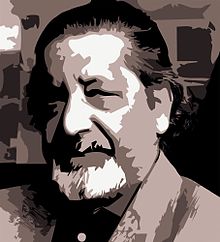| Vidiadhar Surajprasad Naipaul | ||||
 "for having united perceptive narrative and incorruptible scrutiny in works that compel us to see the presence of suppressed histories." "for having united perceptive narrative and incorruptible scrutiny in works that compel us to see the presence of suppressed histories." | ||||
| Date |
| |||
| Location | Stockholm, Sweden | |||
| Presented by | Swedish Academy | |||
| First awarded | 1901 | |||
| Website | Official website | |||
| ||||
The 2001 Nobel Prize in Literature was awarded to the Trinidadian-born British writer Vidiadhar Surajprasad Naipaul (1932–2018), commonly known as V. S. Naipaul, "for having united perceptive narrative and incorruptible scrutiny in works that compel us to see the presence of suppressed histories." The Committee added: "Naipaul is a modern philosopher carrying on the tradition that started originally with Lettres persanes and Candide. In a vigilant style, which has been deservedly admired, he transforms rage into precision and allows events to speak with their own inherent irony." The Committee also noted Naipaul's affinity with the novelist Joseph Conrad:
Naipaul is Conrad's heir as the annalist of the destinies of empires in the moral sense: what they do to human beings. His authority as a narrator is grounded in the memory of what others have forgotten, the history of the vanquished.
Laureate
Main article: V. S. NaipaulIn the heart of many V.S. Naipaul's works, colonialism and post-colonial society are the main settings, and the key themes are alienation and identity in a heterogeneous society. When A House for Mr Biswas was released in 1961, it was an enormous hit and Naipaul's big break on the world stage. His other well-known literary prose include A Flag on the Island (1967), The Mimic Men (1967), In a Free State (1971), Guerrillas (1974).
Deliberations
V. S. Naipaul had been considered by the Nobel committee for many years. He was nominated in 1973 by committee member Artur Lundkvist, and according to another member, Anders Österling, Naipaul was a contender for the prize the following year. On awarding Naipaul the prize, the Swedish Academy singled out his book The Enigma of Arrival (1987) for particular praise, calling it "an unrelenting image of the placid collapse of the old colonial ruling culture and the decline of European neighbourhoods". Other contenders tipped to be in the running for the 2001 Nobel Prize in Literature included Israel's Amos Oz, South Africa's J.M. Coetzee (awarded in 2003), Canada's Margaret Atwood and America's Philip Roth.
Reactions
The choice of V.S. Naipaul caused mixed reactions. In the Swedish newspaper Svenska Dagbladet professor Sture Linnér praised Naipaul's writing: "He is one of the greatest, not just in our generation but on the whole in modern literature." In the same newspaper, critic Mats Gellerfelt heavily criticised the Swedish Academy's decision to award Naipaul. Gellerfelt argued that Naipaul had his best time as a writer long behind him, a "postcolonial literature's favourite grandad", and pointed out three superior candidates for the prize: "In the art of writing novels there are today giants such as Antonio Lobo Antunes, Mario Vargas Llosa and Carlos Fuentes, perhaps the three most prominent novelists alive and still remarkably active and productive, right in the middle of a creativity booming with vigour." British author Martin Amis praised the Swedish Academy's choice of Naipaul, "His level of perception is of the highest, and his prose has become the perfect instrument for realising those perceptions on the page," Amis said, adding that Naipaul's travel writing "is perhaps the most important body of work of its kind in the second half of the century".
Nobel lecture
V. S. Naipaul delivered his Nobel Lecture entitled Two Worlds at the Swedish Academy in Stockholm on 7 December 2001.
References
- The Nobel Prize in Literature 2001 nobelprize.org
- "V.S. Naipaul Awarded 2001 Nobel Prize in Literature". New York Times. 11 October 2001. Retrieved 21 May 2021.
- ^ "The Nobel Prize in Literature 2001: V. S. Naipaul (Press Release)". Svenska Akademien. 11 October 2001. Archived from the original on 20 October 2012.
- V. S. Naipaul – Facts nobelprize.org
- V. S. Naipaul britannica.com
- "Nobelarkivet-1973" (PDF). svenskaakademien.se. 2 January 2024. Retrieved 2 January 2024.
- Johan Svedjedal Min egen elds kurir. Harry Martinsons författarliv, Albert Bonniers förlag 2023, p. 612
- ^ "VS Naipaul wins 2001 Nobel Prize". The Guardian. 11 October 2001.
- Helmer Lång Hundra nobelpris i litteratur 1901-2001, Symposion 2001, p.409-410
- 2001 Nobel lecture nobelprize.org
External links
- 2001 Press release nobelprize.org
- Award ceremony speech nobelprize.org
| 2001 Nobel Prize laureates | |
|---|---|
| Chemistry |
|
| Literature (2001) |
|
| Peace |
|
| Physics |
|
| Physiology or Medicine |
|
| Economic Sciences |
|
